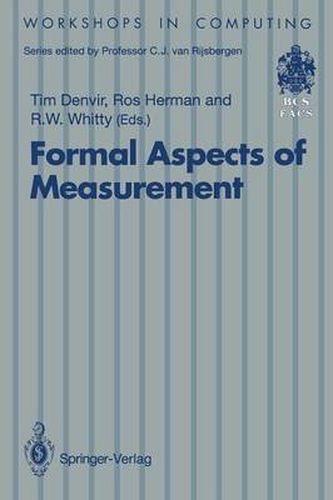Readings Newsletter
Become a Readings Member to make your shopping experience even easier.
Sign in or sign up for free!
You’re not far away from qualifying for FREE standard shipping within Australia
You’ve qualified for FREE standard shipping within Australia
The cart is loading…






This title is printed to order. This book may have been self-published. If so, we cannot guarantee the quality of the content. In the main most books will have gone through the editing process however some may not. We therefore suggest that you be aware of this before ordering this book. If in doubt check either the author or publisher’s details as we are unable to accept any returns unless they are faulty. Please contact us if you have any questions.
This volume is based on the proceedings of the BCS-FACS Workshop on Formal Aspects of Measurement, held at South Bank University in May 1991. Research into software measurement is becoming increasingly important as the range of theories and techniques available to software engineers expands. This workshop was distinguished by the fact that it brought together many of the leading researchers in this area, both from Europe and the USA. The resulting volume contains the 8 papers presented at the meeting, along with 5 additional papers which offer further insight into the topics raised there. It also contains a significant contribution from the NATO-funded Grubstake Group , which was set up in 1988 to promote formalism in software measurement. The volume has been designed to reflect 4 different formal aspects of measurement: section 1 discusses principles of measurement; section 2 looks at how these principles are reflected in the design and implementation of actual measurements; section 3 deals with measurement validation and verification; and section 4 discusses the mathematical and logical foundations, which are an underlying theme in all the preceding sections. Among the actual topics covered are: software measurement - why a formal approach?; complexity measures on trees; multi-dimensional software metrics; algebraic models and metric validation; properties of software measures; specifying internal, external and predictive software metrics; and measurement theory and software metrics. Formal Aspects of Measurement provides a snapshot of recent research on this increasingly important field. It should be of interest to postgraduate students, and researchers in formal and mathematical methods.
$9.00 standard shipping within Australia
FREE standard shipping within Australia for orders over $100.00
Express & International shipping calculated at checkout
This title is printed to order. This book may have been self-published. If so, we cannot guarantee the quality of the content. In the main most books will have gone through the editing process however some may not. We therefore suggest that you be aware of this before ordering this book. If in doubt check either the author or publisher’s details as we are unable to accept any returns unless they are faulty. Please contact us if you have any questions.
This volume is based on the proceedings of the BCS-FACS Workshop on Formal Aspects of Measurement, held at South Bank University in May 1991. Research into software measurement is becoming increasingly important as the range of theories and techniques available to software engineers expands. This workshop was distinguished by the fact that it brought together many of the leading researchers in this area, both from Europe and the USA. The resulting volume contains the 8 papers presented at the meeting, along with 5 additional papers which offer further insight into the topics raised there. It also contains a significant contribution from the NATO-funded Grubstake Group , which was set up in 1988 to promote formalism in software measurement. The volume has been designed to reflect 4 different formal aspects of measurement: section 1 discusses principles of measurement; section 2 looks at how these principles are reflected in the design and implementation of actual measurements; section 3 deals with measurement validation and verification; and section 4 discusses the mathematical and logical foundations, which are an underlying theme in all the preceding sections. Among the actual topics covered are: software measurement - why a formal approach?; complexity measures on trees; multi-dimensional software metrics; algebraic models and metric validation; properties of software measures; specifying internal, external and predictive software metrics; and measurement theory and software metrics. Formal Aspects of Measurement provides a snapshot of recent research on this increasingly important field. It should be of interest to postgraduate students, and researchers in formal and mathematical methods.